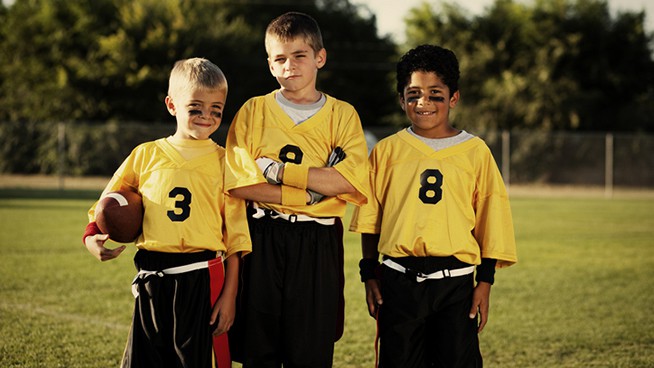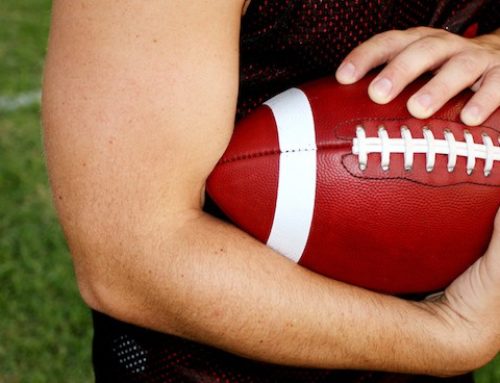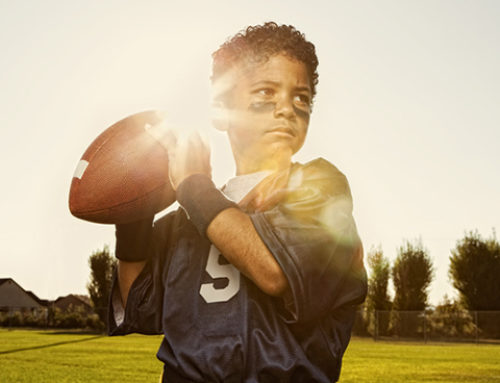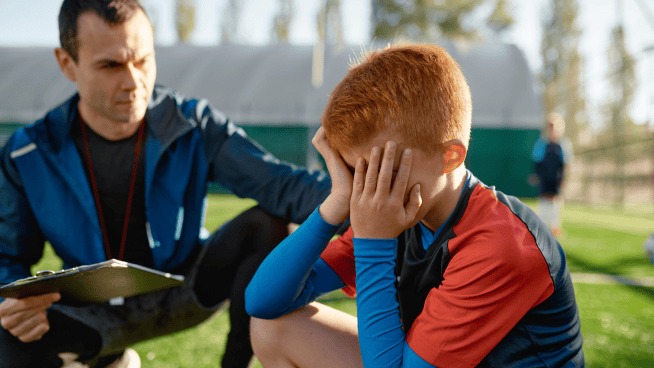How Jack Conklin Went From Having Zero D-I Offers to Being a Projected First-Round Draft Pick
![]()
Jack Conklin is a living lesson in perseverance.
The Michigan State offensive tackle is currently projected to be a top pick in the 2016 NFL Draft, but four short years ago he couldn’t even land a scholarship. It’s hard to believe a player like Conklin could slip through the recruiting cracks, but by the time Signing Day rolled around, he had only one offer—a $2,000-per-semester scholarship to Division II Wayne State University. Knowing he was capable of playing Division I football, Conklin began exploring the possibility of going to prep school. But at the last minute, Michigan State offered him a walk-on spot and a chance to earn a scholarship. The rest is history. After redshirting his freshman season, Conklin went on to start 38 of 39 career games for the Spartans and earn an avalanche of accolades, including a first-team All-America distinction in 2015.
The son of a football coach, Conklin has sound fundamentals and a high football IQ. Scouts think he can make an instant impact in the NFL. It doesn’t hurt that he measures 6-foot-6, weighs 308 pounds and loves knocking defenders around.
STACK caught up with Conklin at EXOS San Diego prior to this year’s NFL Combine to talk recruiting, training and the science of the offensive line.
STACK: What was your relationship with football growing up?
Jack Conklin: I’ve always been a part of football. As soon as I could play full pads, which was in third grade, my dad has coached me all the way through. My dad was actually my high school football coach, too. Having my dad involved as the coach really helped me become one of those coachable guys. A lot of coaches in the NFL and college look for a guy who wants to be a learner and who’s been around the game, and I think that was the thing for me growing up. Coming home, even after a game, I was getting coached up and watching tape. That just built a work ethic and a football knowledge that a lot of guys don’t get.
Was football always your favorite sport?
No. Early in high school I liked basketball even more than football. I did travel basketball and did AAU. But once I realized you can’t be a 6-foot-6 center playing Division I college basketball, I realized football is what I wanted to do. And then I really started to love it. I was this kid who sort of grew steadily throughout high school, so by junior year I was 6-foot-5, 6-foot-6 and realized I could throw people around and I liked doing it a lot. So that’s when I really fell in love with the game.
Talk about your recruiting process. How did a guy like you fail to receive any big offers?
I went to a smaller [high] school, and we hadn’t had a guy go play Division I football in, I think, 25 or 30 years. We didn’t really know how to go about the process, and Division-I coaches usually know the guys they want to recruit by their junior years. I didn’t start going to camps until the summer before my senior year, and by that time it was basically like “Who’s this kid? If I don’t know about him by this point, he must not be very good.” So I went through my senior year and wasn’t getting any luck. I didn’t have any Division I offers and had only one Division II offer, and it was $2,000-a-semester to Wayne State in Detroit. We were looking into prep schools. I was all set to go to Fork Union Military Academy in Virginia. That would give me an extra semester to play. Then I could be an early enrollee in a college that next year. They’ve had a bunch of guys go through there—Vinny Testaverde, Eddie George—so I thought it would be a great place to get more exposure. I started going on junior day visits again, going to see colleges again in the spring of my senior year and telling them that I was going to go to Fork Union. But then Michigan State stepped in and said, “Hey Jack, come walk on this fall and if everything goes well, we’ll put you on scholarship the next semester.”
How did you stay positive during this whole process?
It was tough to stay positive. I’d go on all these recruiting websites and watch guys and think, “I’m just as good as this guy.” But it really came down to my family. My mom and dad telling me I was as good as these guys and to keep working hard and I’ll get my chance. Going through that and not being recruited very hard and not having many people say I could play Division I football, I think it helped me become the player I am now. Not taking practices off, not taking days off, because I know how hard it was to get to this point.

Conklin training at EXOS SD
You made a quick impact at Michigan State. What do you attribute that to?
A lot of it came down to the time and the place, but I give a lot of credit to Will Gholston and Shilique Calhoun, two really good defensive ends that I got to go against in practice my freshman year. Being on the scout team while I was redshirted my first year, I got to go against them every day. I think that really helps you develop quickly. Then, between that and the coaches there helping me understand the offense very quickly, it put me in a spot to be able to step in and have the opportunity to play the following year.
You went from being an unrecruited walk-on to an All-American on full scholarship. Did your success ever surprise you?
It’s real crazy to look back on. Thinking that four years ago, I didn’t know where I was going to be. Now I’m at EXOS and training for the NFL Combine, and it’s just crazy. Going through the process and going through those years at college, it never caught up with me. I was just going through every day, and I feel like in college you never think about what’s happening outside. So you get the accolades, and at that time it’s really cool, but you try to keep your nose to the grindstone and keep working hard and worrying about the program more than yourself. Now looking back, it’s crazy to think that four years ago at this time, I didn’t have a place to call home for football. To now having the opportunity to go to the NFL Combine and be possibly drafted in the first round, it’s just crazy to think about.
What will scouts see from you at the Combine?
You’ll see a lot of explosiveness and a guy who’s really working hard. A guy who’s not just out there going through the motions. He’s putting it all out there and he’s going to be a guy that you can lean on in the fourth quarter to finish out a game and be tough.

Conklin training at EXOS SD
When your training gets tough, what helps you stick with it and keep going?
I look back and see how close I was to not getting a chance. Every day when something hard comes up, I think, “Hey, I was that close to not even getting this chance, and I’ve been given this chance and blessed to be in this situation, so I need to make the most of this for everyone that’s helped me.” I need to keep showing people what they missed out on and what they didn’t believe in.
I know EXOS puts a big emphasis on making sure your diet is fueling you the right way. How has your eating changed since you arrived?
The big thing is getting the protein and eating a lot of vegetables. I don’t think people realize how many vegetables you’re supposed to eat. So a plate breakdown is 25 percent of your plate is supposed to be protein, 25 percent is supposed to be carbs and 50 percent is supposed to be some sort of vegetable. When you think about a regular meal, when you go into a restaurant, you look down at your plate and maybe 20 percent is vegetables. Getting used to eating asparagus, broccoli, Brussels sprouts, I think that’s the biggest change for a lot of guys, just realizing how much of those you have to eat to keep your body energized.
How have you learned to appreciate the intricacies of offensive line play over your career?
I don’t think people really know what goes into being an offensive lineman. So as an example, one of the big plays we ran in college is called Power. We would have to know how to run six different variations of Power, and then you had to know how to run that against different fronts. A defense could go into four or five different fronts depending on the yardage or where they are on the field throughout the game. So we have to be able to know how to run every one of these plays six different ways, and people just don’t realize how much an offensive lineman has to know, but also how well they have to work in unison with the four other guys. If one guy does one thing wrong, then the whole play is messed up.
What piece of advice would you offer to a high school athlete?
The biggest thing I would say to any high school player entering this process of wanting to play college football is just to keep your head up and keep working hard. People will take notice of how hard you work, and if you don’t give up, you’re going to get that chance.
QUICK HITS
Toughest college opponent: Randy Gregory
Favorite cheat meal: Ice cream or boneless wings
Favorite football memory: Beating Michigan at Michigan last season
Favorite NFL player: Joe Thomas
RELATED: Path to the Pros 2016: Meet the Top Prospects
RECOMMENDED FOR YOU
MOST POPULAR
How Jack Conklin Went From Having Zero D-I Offers to Being a Projected First-Round Draft Pick
![]()
Jack Conklin is a living lesson in perseverance.
The Michigan State offensive tackle is currently projected to be a top pick in the 2016 NFL Draft, but four short years ago he couldn’t even land a scholarship. It’s hard to believe a player like Conklin could slip through the recruiting cracks, but by the time Signing Day rolled around, he had only one offer—a $2,000-per-semester scholarship to Division II Wayne State University. Knowing he was capable of playing Division I football, Conklin began exploring the possibility of going to prep school. But at the last minute, Michigan State offered him a walk-on spot and a chance to earn a scholarship. The rest is history. After redshirting his freshman season, Conklin went on to start 38 of 39 career games for the Spartans and earn an avalanche of accolades, including a first-team All-America distinction in 2015.
The son of a football coach, Conklin has sound fundamentals and a high football IQ. Scouts think he can make an instant impact in the NFL. It doesn’t hurt that he measures 6-foot-6, weighs 308 pounds and loves knocking defenders around.
STACK caught up with Conklin at EXOS San Diego prior to this year’s NFL Combine to talk recruiting, training and the science of the offensive line.
STACK: What was your relationship with football growing up?
Jack Conklin: I’ve always been a part of football. As soon as I could play full pads, which was in third grade, my dad has coached me all the way through. My dad was actually my high school football coach, too. Having my dad involved as the coach really helped me become one of those coachable guys. A lot of coaches in the NFL and college look for a guy who wants to be a learner and who’s been around the game, and I think that was the thing for me growing up. Coming home, even after a game, I was getting coached up and watching tape. That just built a work ethic and a football knowledge that a lot of guys don’t get.
Was football always your favorite sport?
No. Early in high school I liked basketball even more than football. I did travel basketball and did AAU. But once I realized you can’t be a 6-foot-6 center playing Division I college basketball, I realized football is what I wanted to do. And then I really started to love it. I was this kid who sort of grew steadily throughout high school, so by junior year I was 6-foot-5, 6-foot-6 and realized I could throw people around and I liked doing it a lot. So that’s when I really fell in love with the game.
Talk about your recruiting process. How did a guy like you fail to receive any big offers?
I went to a smaller [high] school, and we hadn’t had a guy go play Division I football in, I think, 25 or 30 years. We didn’t really know how to go about the process, and Division-I coaches usually know the guys they want to recruit by their junior years. I didn’t start going to camps until the summer before my senior year, and by that time it was basically like “Who’s this kid? If I don’t know about him by this point, he must not be very good.” So I went through my senior year and wasn’t getting any luck. I didn’t have any Division I offers and had only one Division II offer, and it was $2,000-a-semester to Wayne State in Detroit. We were looking into prep schools. I was all set to go to Fork Union Military Academy in Virginia. That would give me an extra semester to play. Then I could be an early enrollee in a college that next year. They’ve had a bunch of guys go through there—Vinny Testaverde, Eddie George—so I thought it would be a great place to get more exposure. I started going on junior day visits again, going to see colleges again in the spring of my senior year and telling them that I was going to go to Fork Union. But then Michigan State stepped in and said, “Hey Jack, come walk on this fall and if everything goes well, we’ll put you on scholarship the next semester.”
How did you stay positive during this whole process?
It was tough to stay positive. I’d go on all these recruiting websites and watch guys and think, “I’m just as good as this guy.” But it really came down to my family. My mom and dad telling me I was as good as these guys and to keep working hard and I’ll get my chance. Going through that and not being recruited very hard and not having many people say I could play Division I football, I think it helped me become the player I am now. Not taking practices off, not taking days off, because I know how hard it was to get to this point.

Conklin training at EXOS SD
You made a quick impact at Michigan State. What do you attribute that to?
A lot of it came down to the time and the place, but I give a lot of credit to Will Gholston and Shilique Calhoun, two really good defensive ends that I got to go against in practice my freshman year. Being on the scout team while I was redshirted my first year, I got to go against them every day. I think that really helps you develop quickly. Then, between that and the coaches there helping me understand the offense very quickly, it put me in a spot to be able to step in and have the opportunity to play the following year.
You went from being an unrecruited walk-on to an All-American on full scholarship. Did your success ever surprise you?
It’s real crazy to look back on. Thinking that four years ago, I didn’t know where I was going to be. Now I’m at EXOS and training for the NFL Combine, and it’s just crazy. Going through the process and going through those years at college, it never caught up with me. I was just going through every day, and I feel like in college you never think about what’s happening outside. So you get the accolades, and at that time it’s really cool, but you try to keep your nose to the grindstone and keep working hard and worrying about the program more than yourself. Now looking back, it’s crazy to think that four years ago at this time, I didn’t have a place to call home for football. To now having the opportunity to go to the NFL Combine and be possibly drafted in the first round, it’s just crazy to think about.
What will scouts see from you at the Combine?
You’ll see a lot of explosiveness and a guy who’s really working hard. A guy who’s not just out there going through the motions. He’s putting it all out there and he’s going to be a guy that you can lean on in the fourth quarter to finish out a game and be tough.

Conklin training at EXOS SD
When your training gets tough, what helps you stick with it and keep going?
I look back and see how close I was to not getting a chance. Every day when something hard comes up, I think, “Hey, I was that close to not even getting this chance, and I’ve been given this chance and blessed to be in this situation, so I need to make the most of this for everyone that’s helped me.” I need to keep showing people what they missed out on and what they didn’t believe in.
I know EXOS puts a big emphasis on making sure your diet is fueling you the right way. How has your eating changed since you arrived?
The big thing is getting the protein and eating a lot of vegetables. I don’t think people realize how many vegetables you’re supposed to eat. So a plate breakdown is 25 percent of your plate is supposed to be protein, 25 percent is supposed to be carbs and 50 percent is supposed to be some sort of vegetable. When you think about a regular meal, when you go into a restaurant, you look down at your plate and maybe 20 percent is vegetables. Getting used to eating asparagus, broccoli, Brussels sprouts, I think that’s the biggest change for a lot of guys, just realizing how much of those you have to eat to keep your body energized.
How have you learned to appreciate the intricacies of offensive line play over your career?
I don’t think people really know what goes into being an offensive lineman. So as an example, one of the big plays we ran in college is called Power. We would have to know how to run six different variations of Power, and then you had to know how to run that against different fronts. A defense could go into four or five different fronts depending on the yardage or where they are on the field throughout the game. So we have to be able to know how to run every one of these plays six different ways, and people just don’t realize how much an offensive lineman has to know, but also how well they have to work in unison with the four other guys. If one guy does one thing wrong, then the whole play is messed up.
What piece of advice would you offer to a high school athlete?
The biggest thing I would say to any high school player entering this process of wanting to play college football is just to keep your head up and keep working hard. People will take notice of how hard you work, and if you don’t give up, you’re going to get that chance.
QUICK HITS
Toughest college opponent: Randy Gregory
Favorite cheat meal: Ice cream or boneless wings
Favorite football memory: Beating Michigan at Michigan last season
Favorite NFL player: Joe Thomas











